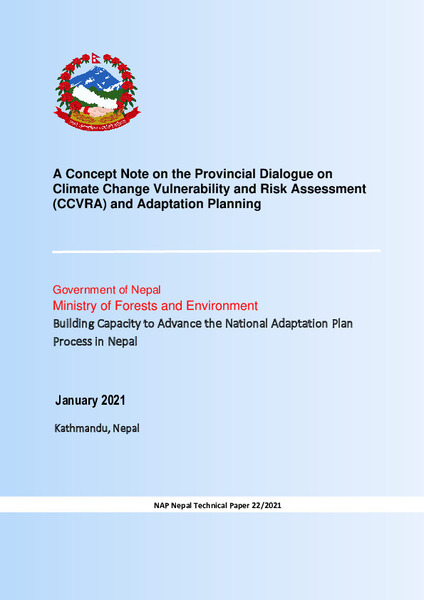| dc.description | Nepal’s vulnerability to climate change impacts—combined with a high level of poverty and
inequality—underscores the importance of prioritizing climate change adaptation in the
country’s development agenda (MoFE, 2020), which has led to the introduction and
implementation of policies, plans, programs, and strategies that support and facilitate climate
change adaptation at national and sub-national levels. Aligning with the country priority, Nepal
formally started the National Adaptation Plan (NAP) formulation process in 2015, adhering to the
Cancun Adaptation Framework (CAF)1 and the Article 72 of the Paris Agreement (PA) to identify
the medium and long-term adaptation needs of the country.
Building on the country’s experiences of the National Adaptation Programme of Action (NAPA)
formulation and implementation, Nepal is formulating NAP through a multi-sectoral working
group and Leave-No-One-Behind (LNOB) 3 approach. For this, initially, nine sectors/areas4 were
identified and led by the concerned ministry through the formation of the working groups (seven
thematic and two cross-cutting). However, after the promulgation of the new constitution and
implementation of federalism in Nepal, which introduced the National Climate Change Policy
(NCCP) 2019, the working groups were updated and reformed to suit the new federal context and
the provisions of the NCCP. At present, eight thematic working groups (TWGs) [i) Agriculture and
Food Security, ii) Forests, Biodiversity and Watershed Conservation, iii) Disaster Risk Reduction
and Management, iv) Health, Drinking Water and Sanitation, v) Industry, Transport and Physical
Infrastructures, vi) Rural and Urban Settlements, vii) Tourism, Natural and Cultural Heritage, and
viii) Water Resources and Energy] and four cross-cutting working groups [i) Gender and Social
Inclusion, Livelihood and Governance, ii) Awareness Raising and Capacity Building, iii) Research,
Technology Development and Transfer, and iv) Climate Finance Management] are formed and led
by the respective ministries | en_US |


